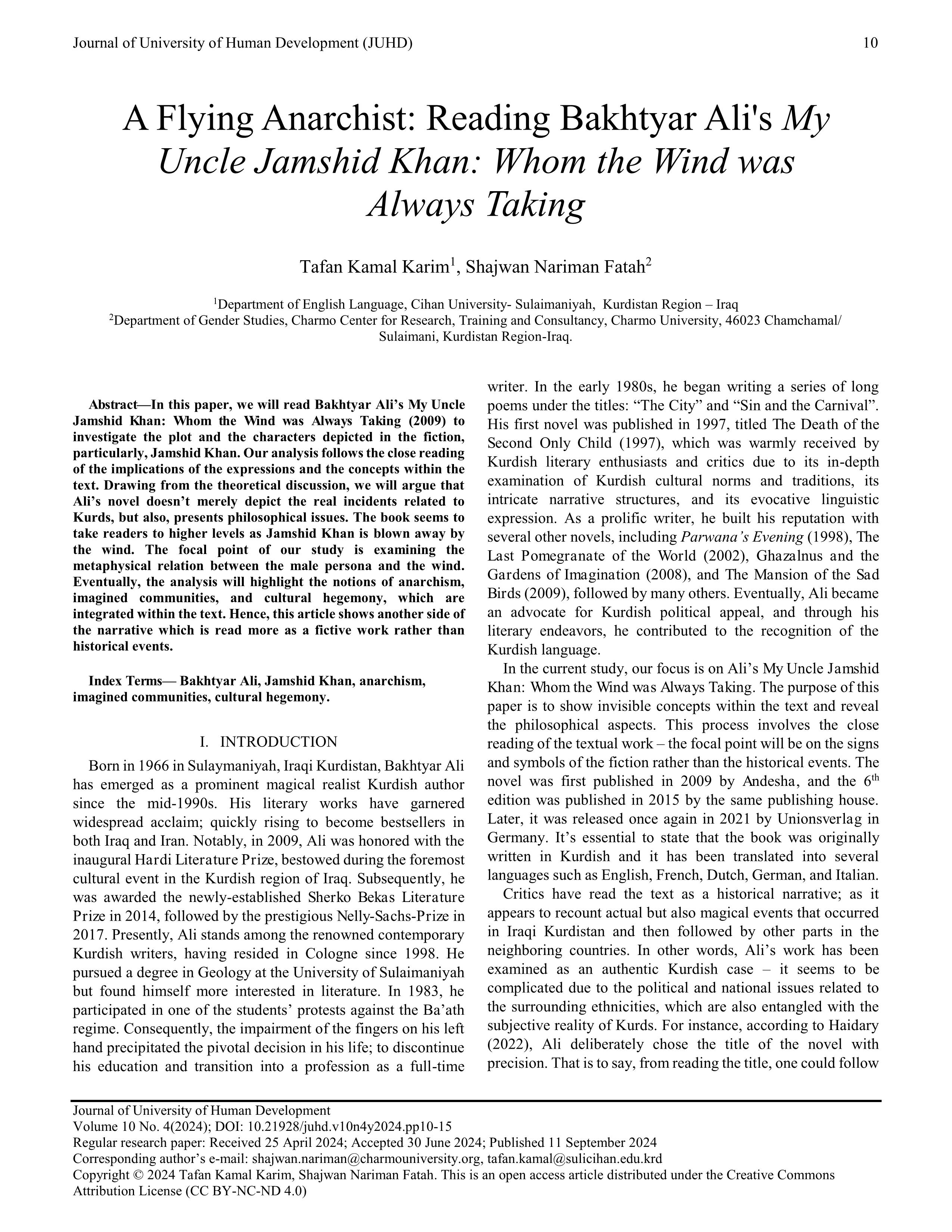A Flying Anarchist: Reading Bakhtyar Ali's My Uncle Jamshid Khan: Whom the Wind was Always Taking
DOI:
https://doi.org/10.21928/juhd.v10n4y2024.pp10-15Keywords:
Bakhtyar Ali, Jamshid Khan, Anarchism, Imagined communities, Cultural hegemonyAbstract
In this paper, we will read Bakhtyar Ali’s My Uncle Jamshid Khan: Whom the Wind was Always Taking (2009) to investigate the plot and the characters depicted in the fiction, particularly, Jamshid Khan. Our analysis follows the close reading of the implications of the expressions and the concepts within the text. Drawing from the theoretical discussion, we will argue that Ali’s novel doesn’t merely depict the real incidents related to Kurds, but also, presents philosophical issues. The book seems to take readers to higher levels as Jamshid Khan is blown away by the wind. The focal point of our study is examining the metaphysical relation between the male persona and the wind. Eventually, the analysis will highlight the notions of anarchism, imagined communities, and cultural hegemony, which are integrated within the text. Hence, this article shows another side of the narrative which is read more as a fictive work rather than historical events.
References
Abrams, M. H., & Geoffrey, G. A. (2015). A glossary of literary terms (9th ed.). Cengage Learning
Ahmed, M. (2024, February 13). Khak Media. My Uncle Jamshid. Retrieved from www.khaktv.net/all-detail.aspx?jimare=6330&type=farhang.
Ali, B. (2022). My Uncle Jamshid Khan: Whom the Wind was Always Taking (4th ed.). Andesha Publications.
Anderson, B. (1983). Imagined communities: Reflections on the origin and spread of nationalism. Verso.
Bakhtyar Ali. (n.d.). Retrieved from Mertin Witt: https://mertinwitt-litag.de/portfolio-items/bachtyar-ali/
Britannica, T. Editors of Encyclopaedia. (2024, February 23). Magic realism. Encyclopedia Britannica. https://www.britannica.com/art/magic-realism
Calhoun, C. (2016). The importance of imagined communities—and Benedict Anderson. Debats: Revista de cultura, poder i societat, 1, 11-16
Chattopadhyay, P. (n.d.). What is magical realism? Definition and examples of magical realism. P.1.
Cole, N. (2020, January 5). What Is Cultural Hegemony? Retrieved from Thought Co.: https://www.thoughtco.com/cultural-hegemony-3026121
Cortes-Ramirez, E. E. (2015). Cultural hegemony today: From cultural studies to critical pedagogy.
Dirlik, A., Rosemont, F., Miller, M. A., & Woodcock, G. (2023, October 28). Anarchism. Encyclopedia Britannica. https://www.britannica.com/topic/anarchism
English anarchist thought. (n.d.). Retrieved from Britannica: https://www.britannica.com/topic/anarchism/English-anarchist-thought
Goldman, E. (2019). Anarchism: What it really stands for. In Ideals and Ideologies (pp. 305-313). Routledge
Gramsci, A. (2011). Prison Notebooks Volume 2 (Vol. 2). Columbia University Press
Haidary, S. (2022, April 29). My Uncle Jamshid Khan’s flights: Between Remembering and Forgetting. CHRA.TV.
Jamal, H. (2023, December 10). Jamshid Khan’s flying. WTARIKURD.
Kropotkin, P. (1910). Anarchism. Retrieved from Encyclopedia Britannica: http://dwardmac.pitzer.edu/anarchist_archives/kropotkin/britanniaanarchy.html
Miller, D. (1984). Anarchism. J. M. Dent & Sons Ltd.
Restless Soma. (n.d.). Jamshid (Persian: Jamshid) aka Yima, 4th Shah of the Pishdadian dynasty of Iran. Retrieved from https://restlesssoma.com.au/restlesssoma/index.php?topic=3521.0
Roberts, J. T. (2023, August 22). Anarchism & Revolution: Who was Mikhail Bakunin? Retrieved from The Collector: https://www.thecollector.com/who-was-bakunin/
Shareef, M. (2014). The United States, Iraq, and the Kurds: Shock, awe, and aftermath. Routledge.
Walter, N. (2020, September 30). About Anarchism. Retrieved from The anarchist Library: https://theanarchistlibrary.org/library/nicolas-walter-about-anarchism

Downloads
Published
How to Cite
Issue
Section
License
Copyright (c) 2024 Tafan Kamal Karim, Shajwan Nariman Fatah

This work is licensed under a Creative Commons Attribution-NonCommercial-NoDerivatives 4.0 International License.


